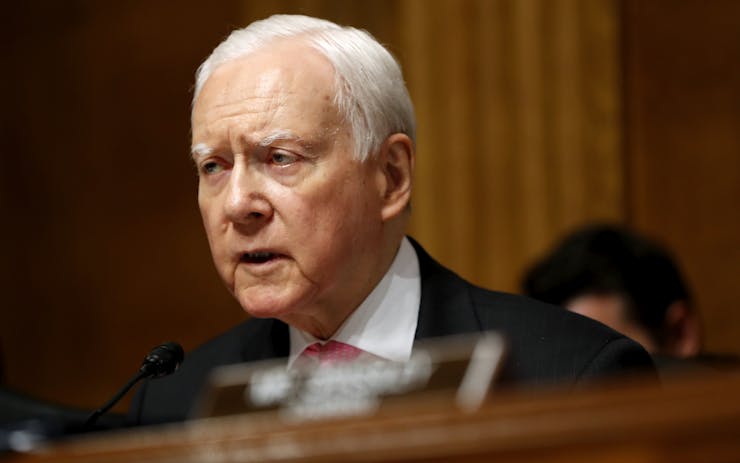In a surprising move, US Sen. Orrin Hatch, a conservative Utah Republican and longtime cannabis prohibitionist, today introduced a bill to encourage more research into the effectiveness of medical cannabis.
Hatch didn’t just quietly introduce the bill, though. Rather, he took to the Senate floor and gave a passionate speech in defense of the use of medical marijuana, saying the plant “has the potential to help millions of Americans,” and “can truly change people’s lives for the better.”
“It’s high time to address research into medical marijuana,” he added. “Our country has experimented with a variety of state solutions without properly delving into the weeds on the effectiveness, safety, dosing, administration, and quality of medical marijuana. All the while, the federal government strains to enforce regulations that sometimes do more harm than good. To be blunt, we need to remove the administrative barriers preventing legitimate research into medical marijuana, which is why I’ve decided to roll out the MEDS Act.”
What the MEDS Bill Would Do
The Marijuana Effective Drug Study Act of 2017 (MEDS Act) debuts with four other co-sponsors, including Sens. Brian Schatz (D-HI), Chris Coons (D-DE), Cory Gardner (R-CO), and Thom Tillis (R-NC).
The MEDS bill would:
- Encourage more research on the potential medical uses of marijuana by streamlining the research registration process, without imposing a scheduling determination on the Drug Enforcement Agency (DEA).
- Make marijuana more available for legitimate scientific and medical research and the commercial production of any FDA-approved drugs derived from marijuana.
- Retain important checks to protect against diversion or abuse of the controlled marijuana substances.
- Require the National Institute on Drug Abuse (NIDA) to develop and publish recommendations for good manufacturing practices for growing and producing marijuana for research.
- Require the attorney general to increase the national marijuana quota in a timely manner to meet the changing medical, scientific, and industrial needs for marijuana.
- Codify the administration’s decision to terminate the Public Health Service and its review of proposals for medical research on marijuana.
- Prevent the Department of Health and Human Services from instituting any other marijuana-specific protocol reviews, other than the voluntary review that a researcher can request from National Institutes of Health (NIH) in order to access the expedited DEA registration process.
A Movement Moment
Hatch’s statement on the Senate floor today represented one of the more remarkable moments in recent medical marijuana history. A longtime Republican icon, Hatch represents one of the nation’s most culturally conservative states. During his speech, he reiterated that he remains “strongly against the recreational use of marijuana,” and is “concerned about the cottage industry springing up” around the adult use of cannabis.
Nevertheless, he said, “we would be remiss if we threw out the baby with the bathwater.”
“It doesn’t take a sweeping overhaul of Obamacare” to substantially improve America’s healthcare, Hatch said, speaking of the medical potential of cannabis-based treatments. “Sometimes even small things can have big impacts on people’s lives.”
Why Hatch? Why Now?
What brought about the conservative senator’s changed outlook? He left a few clues in his floor speech. It sounds as though personal stories, the evidence of close friends, and America’s opioid crisis had a profound effect on his thinking around the issue.
Hatch included a reference to “my friend” who found him or herself taking 17 pills a day, including powerful opioids. That friend was able to find relief, and leave behind the pills, Hatch said, thanks to medical cannabis.
The opioid crisis clearly had an effect. “In Utah, and across the nation, opioid abuse continues to ravage hard-working families,” Hatch said. “Many are seeking non-narcotic alternatives,” including medical cannabis. “After deliberative thought,” he said, “I’ve determined that it’s an alternative worth pursuing.”
That statement is something close to stunning. Just a few months ago many political leaders dismissed out-of-hand the notion that cannabis could be a helpful tool in combatting America’s opioid crisis.
To be clear: Hatch’s bill doesn’t federally legalize medical marijuana. It ramps up scientific access to cannabis research. But for a senator like Hatch, that represents an enormous step forward on this issue. And his floor speech hints that he may be an advocate in the ongoing fight to protect the legal rights of medical patients in legal states.
The bipartisan nature of his MEDS Act, Hatch said, “represents what our two parties can accomplish when we work together in good faith.”





